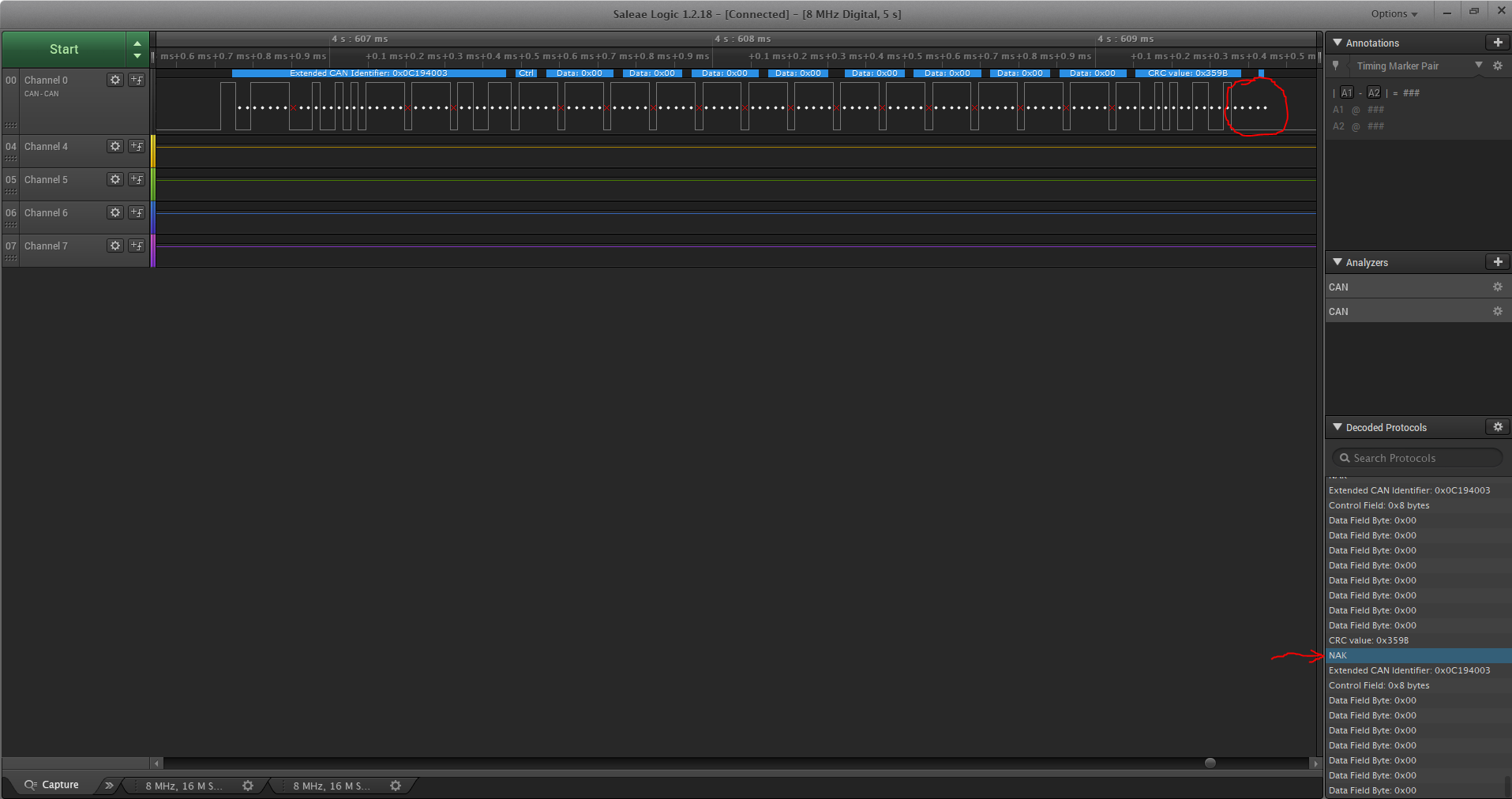I have a problem with the NAK on the CAN bus. On STM32F303RE I wrote a code for communication via CAN bus with car dashboard (Instrument Panel Cluster). The communication works, I manage to receive frames from the device (e.g. below on the screen - a frame with ID:C194003) but each frame gets at the end of NAK.
I manage to send a signal on CAN bus (I send 0x700 frame) from which sometimes I get ACK and sometimes NAK. I don't know completely why the device doesn't expose the ACK bit. The Cluster Panel instrument has been taken out of the car so I don't think the CAN communication is badly done there. The transmission speed is about (50kbps)
code for clock initialization:
void SystemClock_Config(void)
{
RCC_OscInitTypeDef RCC_OscInitStruct = {0};
RCC_ClkInitTypeDef RCC_ClkInitStruct = {0};
RCC_PeriphCLKInitTypeDef PeriphClkInit = {0};
/** Initializes the CPU, AHB and APB busses clocks
*/
RCC_OscInitStruct.OscillatorType = RCC_OSCILLATORTYPE_HSE;
RCC_OscInitStruct.HSEState = RCC_HSE_ON;
// RCC_OscInitStruct.HSEState = RCC_HSE_BYPASS;
// RCC_OscInitStruct.HSIState = RCC_HSI_ON;
RCC_OscInitStruct.PLL.PLLState = RCC_PLL_ON;
RCC_OscInitStruct.PLL.PLLSource = RCC_PLLSOURCE_HSE;
RCC_OscInitStruct.PLL.PLLMUL = RCC_PLL_MUL9;
RCC_OscInitStruct.PLL.PREDIV = RCC_PREDIV_DIV1;
if (HAL_RCC_OscConfig(&RCC_OscInitStruct) != HAL_OK)
{
Error_Handler();
}
/** Initializes the CPU, AHB and APB busses clocks
*/
RCC_ClkInitStruct.ClockType = RCC_CLOCKTYPE_HCLK|RCC_CLOCKTYPE_SYSCLK
|RCC_CLOCKTYPE_PCLK1|RCC_CLOCKTYPE_PCLK2;
RCC_ClkInitStruct.SYSCLKSource = RCC_SYSCLKSOURCE_PLLCLK;
RCC_ClkInitStruct.AHBCLKDivider = RCC_SYSCLK_DIV1;
RCC_ClkInitStruct.APB1CLKDivider = RCC_HCLK_DIV2;
RCC_ClkInitStruct.APB2CLKDivider = RCC_HCLK_DIV2;
if (HAL_RCC_ClockConfig(&RCC_ClkInitStruct, FLASH_LATENCY_2) != HAL_OK)
{
Error_Handler();
}
PeriphClkInit.PeriphClockSelection = RCC_PERIPHCLK_USART2;
PeriphClkInit.Usart2ClockSelection = RCC_USART2CLKSOURCE_PCLK1;
if (HAL_RCCEx_PeriphCLKConfig(&PeriphClkInit) != HAL_OK)
{
Error_Handler();
}
}
CAN parameters:
hcan.Instance = CAN;
hcan.Init.Prescaler = 45;
hcan.Init.Mode = CAN_MODE_NORMAL;
hcan.Init.SyncJumpWidth = CAN_SJW_1TQ;
hcan.Init.TimeSeg1 = CAN_BS1_13TQ;
hcan.Init.TimeSeg2 = CAN_BS2_2TQ;
hcan.Init.TimeTriggeredMode = DISABLE;
hcan.Init.AutoBusOff = DISABLE;
hcan.Init.AutoWakeUp = DISABLE;
hcan.Init.AutoRetransmission = DISABLE;
hcan.Init.ReceiveFifoLocked = DISABLE; // New message will overwrite existing message in FIFO memory
hcan.Init.TransmitFifoPriority = DISABLE; // Priority driven by the identifier of the message
if (HAL_CAN_Init(&hcan) != HAL_OK)
{
Error_Handler();
}
CAN Tx function:
void CAN_Tx(uint32_t CanID, uint8_t CanDLC, uint8_t CANmsg[])
{
uint32_t pTxMailbox;
CAN_TxHeaderTypeDef CanTxHeader;
CanTxHeader.DLC = CanDLC;
CanTxHeader.ExtId = CanID;
CanTxHeader.IDE = CAN_ID_EXT;
CanTxHeader.RTR = CAN_RTR_DATA;
if ((HAL_CAN_AddTxMessage(&hcan, &CanTxHeader, CANmsg, &pTxMailbox)) != HAL_OK )
{
Error_Handler();
}
while(HAL_CAN_IsTxMessagePending(&hcan, pTxMailbox));
Print_CAN_Frame("Tx",CanTxHeader.ExtId, CanTxHeader.DLC, CANmsg);
}

